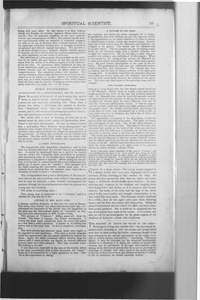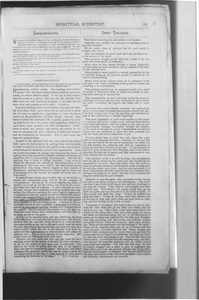The Ministry of Spirits the Belief of the Ages
The Ministry of Spirits the Belief of the Ages.—Washington Irving thus testifies that “the doctrine of departed spirits returning to visit the scenes and beings which were dear to them during the bodies existence, though it has been debased by the absurd superstition of the vulgar, in itself is awfully solemn and sublime;” concluding, “However lightly it may be ridiculed, yet the attention involuntarily yielded to it whenever it is made the subject of serious discussion. and its prevalence in all ages and countries, even among newly discovered nations that have had no previous interchange of thought with other parts of the world, prove it to be one of those mysterious and instinctive beliefs to which, if left to ourselves, we should naturally incline.”
Communication
“In what respect, and to what extent, does the action of a disembodied spirit upon our organism differ from that of an embodied spirit?”
Disembodied, without a body. Can anything exist without a body? No! the lowest atom has form, and that constitutes a body, no matter what its shape. If we say in what respect does the action of a person who has left the material form differ from one still inhabiting it, would it not make the fact more clear, and express a wider truth? I think so.
A person dwelling in the material form acts upon one upon the same plane, first: upon those who are principled in gross life, the same as capital does upon labor; it feeds the lowest; senses by the gratification of those senses. Second: upon those in whom the intellectual life is partly opened, by creating laws by the force of custom, and compelling them to act up to them, under penalties for their infringement. Third: those in whom the intellect and genius are opened, by the laws of sympathy, the silent influence of habit and example, and the reciprocity of sentiments. This is man upon man upon the material plane.
A spirit in the spiritual body acts upon man in the natural body upon the lowest plane, by putting ideas into his mind, in order to lead him to do his (the spirit’s) will, even to the accomplishment of deviltries suited to his organization. Upon the intellectual plane, by giving him ideas and the means of putting them into operation, no matter whether in harmony or otherwise with his surrounding circumstances. And also by teaching him a belief in things immortal. Upon those in whom the affections are opened, by instructing them in the workings of their own inner selves; the laws which should govern their own being without regard to laws outside of themselves; psychical attraction to others, and its cause, and a knowledge of a life beyond the portals of death, and the Cod within.
A material man acting upon another can, as far as his externals are concerned, cause him to be the creature of circumstances. He can by his acts so regulate the affairs of another as to call up all the virtues and vices of his nature, and make him a god or a demon. A spirit can only act upon his most interior soul, insidiously instilling, by ideas and magnetism, the different emotions, the most singular experieaces,— experiences that are sensed as well as intellectually known. A spirit can so psychologize a person as to make them think they really see things before them, when they are only appearances created by the controlling power. A person in the natural body cannot do this to another, if that other is in full possession of their mental faculties, because their selfhood denies the control. But the moment they submit their will, that moment their spirit leaves their natural bodies, and they take upon them the life of the spirit.
A spirit in the material body, and one inhabiting the form of the affections, can have the same experiences, with this difference—that the one still living on earth, in order to effect the same results as the one in the spirit world, must lay aside the laws that control the natural form, and adopt the lairs that control spirit; while the one in the spiritual form must lay aside the laws appertaining to that condition, and adopt the material ones. This is as to-persons of the same sex. Different sexes act differently upon each other.
Educate your own souls, and then you can cause the most startling results by the means of the will, the only real power, as far as the action of man upon man is concerned. The spirit in the world of spirits, and the man in the material form, will then be co-equals in power. The secret and silent influence that pervades social life can be made to work for the advancement of the race, in mass, instead of a few actors controlling the destinies of the many.
Editor's notes


